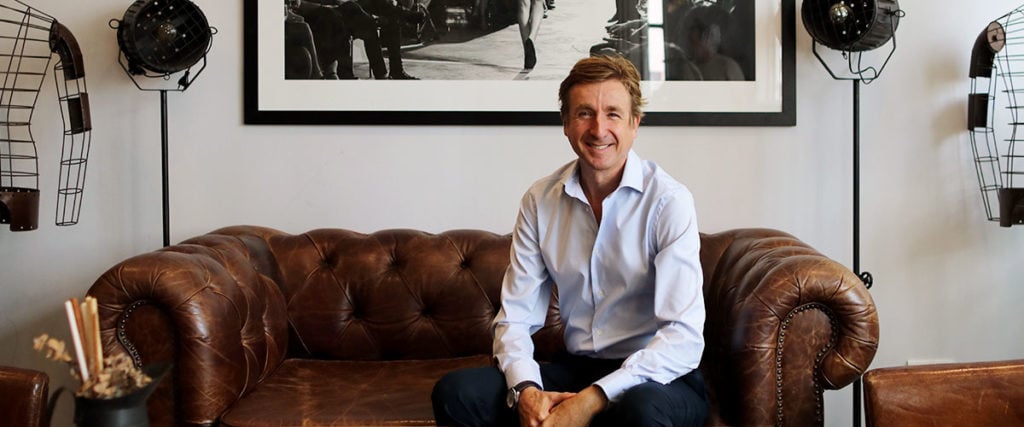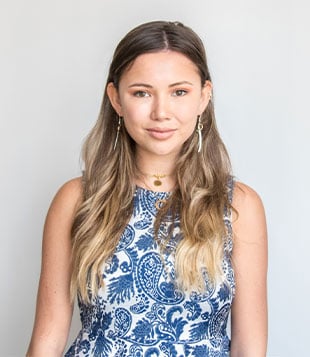Serial entrepreneur Constant Tedder, CEO of Asia-Pacific’s largest flexible workspace operator – the Hive, on the compelling story behind how he became the co-founder of 500 million dollar gaming company Jagex – and is leading the way in the future of workspaces.
It’s been said that entrepreneurship is a calling, not a job. Something you feel you need to follow, with no guarantee of a paycheck. That there are certain personality traits common to all entrepreneurs, such as passion, creativity, and a willingness to take risks, is well documented. But, every entrepreneur has a different story about why he or she decided to take the leap and start their own business. For Constant Tedder, serial entrepreneur and founder of the Hive, that moment of realisation came when the father of a school friend was unceremoniously fired, aged 48, and spent four years seeking and getting his legal settlement. “It was one of those defining moments where I realised that, regardless of how many years you might have worked for an established company, you could still be at risk of losing your job when you’re older, and not that old!” he explains. “Of course, some people make it to the top, but not everyone does. What they don’t teach you at the university career centre is that companies have to shed people at a senior level, and as you can imagine, trying to find an alternative at age 50 can be quite painful.” It was this look down the telescope of the future that set Constant on an entrepreneurial path, from starting the 500 million dollar gaming company Jagex to founding Asia Pacific’s largest coworking operator, the Hive, and everything in between.
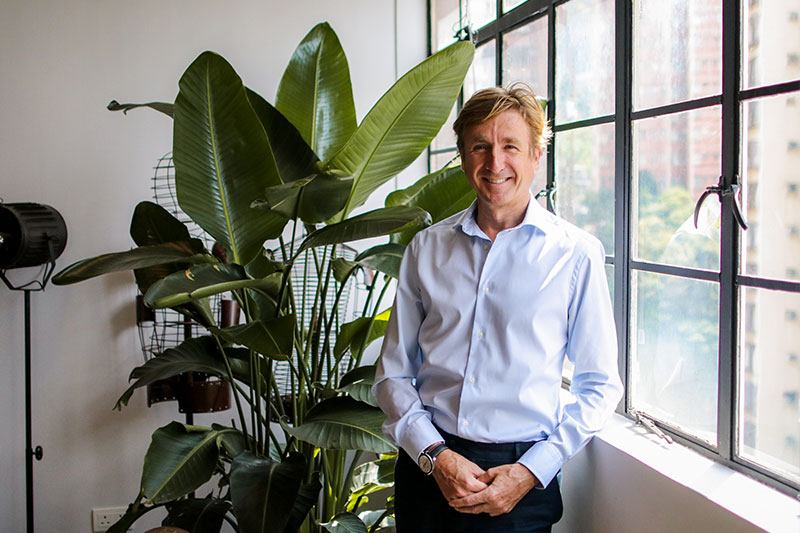
Constant Tedder, Founder & CEO of the Hive
For many, it’s the perceived risks associated with entrepreneurship that deters would-be entrepreneurs from following their passion. For Constant, however, it was the potential insecurity of traditional work that made entrepreneurship the only road worth travelling. Added to this, part of the allure was the potential risk/reward ratio: “When I was 15, my father got himself into some financial trouble which changed our family’s financial circumstances quite dramatically. What I took away from that experience was the realisation that the only way to possibly recover was by doing something riskier, with, potentially, a better payoff in the end, if I was lucky. I didn’t have the patience for the reward to come at the end of a long traditional career.” Still, setting out on that path, especially from a place of relative comfort, is not necessarily an easy call. “I think if you come from a stable background then, in a way, traditional corporate-style jobs look quite attractive. Your standard of living is already reasonably high, so, why take the risk? But, if your standard of living is collapsing, or you’re starting from a low position, then you’re much more likely to be in the frame of mind of, ‘Well, I haven’t got quite so much to lose by taking a more risky journey,’ making the idea of starting a business seem less scary.” And so, armed with his new perspective on life and work, Constant set about making his entrepreneurial dreams a reality while still at school, starting with his very first enterprise – a lifestyle magazine for students.
Before he could eschew traditional career paths for good, Constant paid his dues by interning at Saatchi and Saatchi and Credit Suisse First Boston over a couple of summers. “What both those summer experiences confirmed to me is that I didn’t want to go into either industry! At the bank, I was surrounded by people who were super highly qualified yet, seemed utterly unhappy in their jobs. The environment we were in, and the tasks given felt like such a waste of intellectual energy. At Saatchi and Saatchi, on the other hand, I realised pretty quickly that advertising is all about distorting people’s needs and manufacturing want, which didn’t really mesh with me morally.”
You might also like Uber: How They See Their Future, and What They’re Planning Next
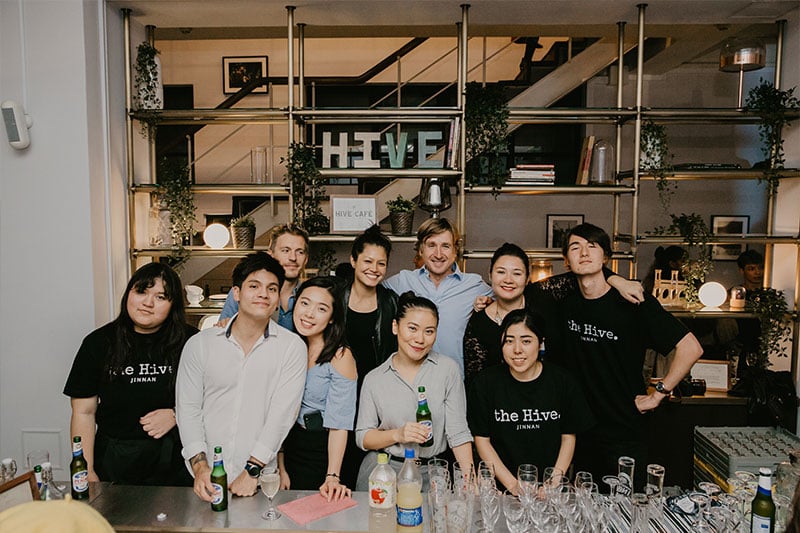
Team Photo at the Hive Jinnan
From a relatively early age, he felt the importance of “being happy in what you do.” In today’s ever-changing workplace, that may sound obvious, but in the 1990s, when job security and financial benefits were still king, that concept of “doing what you love” was fairly ahead of its time. “Ultimately, it’s just not about the money. It’s about creating something that’s meaningful and valuable – something that you’re proud of and enjoy doing. In my opinion, creating things feeds the soul in a way that just making money can never do.”
After graduating from the University of Bristol, he kickstarted his entrepreneurial journey for real with Frontier Media in 1994, an interactive voice response service with newspaper clients such as The Sun, The Sunday Times, and The Guardian. In 1999, he founded Gameswire.com, an online retailer of games. It was whilst searching for online games to add to the site that a fluke led to him to co-found Jagex in 2001. Future co-founder Andrew Gower was still at Cambridge when Constant arranged to meet him for a pint in a local pub. It was during this meeting that Andrew revealed he had built an MMO that played in the browser. Later going back to the college Andrew showed Constant a very early version of RuneScape, with 2D sprites traversing a 3D environment. “It was very rough,” admits Constant, “but you could feel the attraction of the gameplay right away. Andrew’s genius was in designing a game that could be delivered to the player in the browser, without any need for software installation. It was a gigantic lightbulb moment.”
In February 2001, the newly formed company launched the world’s first Java-based MMORPG that played in the browser – RuneScape, which became hugely popular with over 100 million players, which still draws players in their millions. During his time as CEO, Constant oversaw the company’s growth from a team of 3 (just Andrew, Paul and himself) to over 450 over an eight-year period of unbroken profitable growth. In 2007, he voluntarily stepped away to enter the renewable space, founding Dawn Energy, a successful wind farm developer in Scotland, and Expense Magic, an expense management service, in 2010. A year later, he sold most of his stake in Jagex for an undisclosed sum.
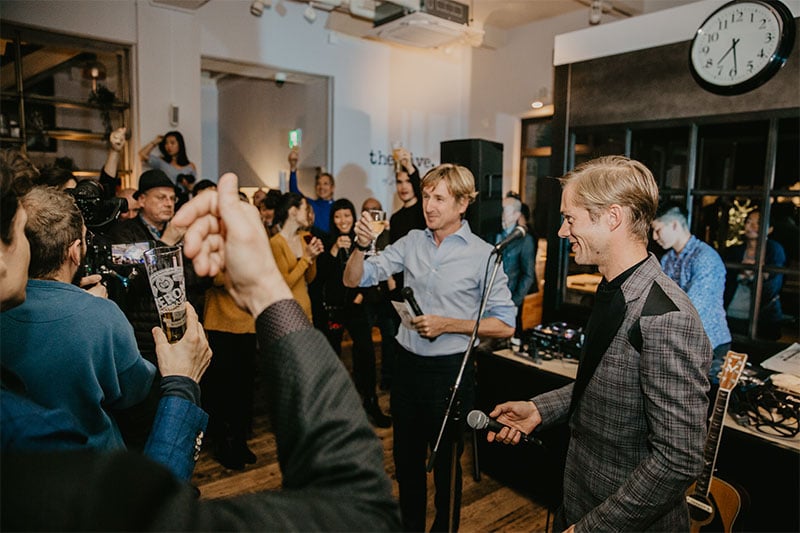
Launch Party at the Hive Jinnan
When asked why he would voluntarily leave one of the UK’s most successful video game developers and publishers, Constant is clear. “At some point during our growth from 3 to 450 people, the nature of the challenge changed. When you find your time is completely taken up with a lot of HR and internal management, it’s a lot less exciting. The skills needed for a company at that stage, which is less about bootstrapping and scrambling to expand and more about streamlining your operations, require a different type of company leader. So, it was time for me to step aside and say, ‘You know what? I’ve done the part that I enjoy, we’ve hit the goal of 1 million subscribers, and now it’s time to let someone with different skills run the company from here.”
Using capital generated from the sale of Jagex, Constant moved to Hong Kong in 2011, and founded Asia’s largest and most dynamic coworking space operator, the Hive Worldwide, in 2012. To date, he has built the company to 22 locations in 7 countries – Hong Kong, Singapore, Vietnam, Thailand, Taiwan, Japan and, most recently, Australia. Why coworking, you ask? Well, part of the reason is down to a coincidence where, on at least two occasions – The Economist ran articles on the industry he is looking at entering. The first time it happened was in 2001, he was just in the middle of deciding whether or not to put his very last penny into Jagex, when The Economist ran an article on the Top 10 Most Addictive Pastimes. “I think gambling was #1, pornography or drugs was #2, and then #3 was online gaming, specifically MMORPGs,” he recalls. “At that time, I didn’t know much about computer games and practically nothing about MMOs, but I thought, ‘Well, online gaming is the most addictive legal pastime!’ And, that’s what convinced me that I should make the investment in Jagex. The same thing happened around the time I was thinking of starting the Hive in Dec 2011 – the Economist ran another article – on the coming workplace revolution. The magazine has a knack of being well on business trends!”
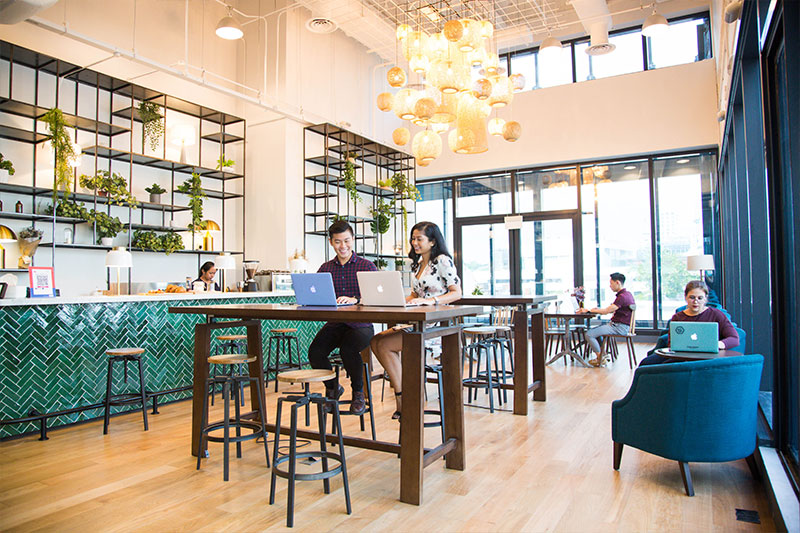
the Hive Café, Singapore
As an entrepreneur, it was easy for Constant to see the appeal of coworking. Following on from his very first steps into the world of startups, his move into the coworking space came about from that same original desire to work in and create an environment that felt as good as it was productive. “It has been a long time since I started in business, but I still remember trying to figure everything out in London, on my own, initially at home – going more than a little bit crazy. No one around you. No one to share ideas and problems with. Not easy to find even the basic collaborative services that we now take for granted. When I started my first company in London – I was based at a council-owned business centre in a light industrial unit – basically a garage. That became my home for 4 years. So, the benefits of working from a nicely designed coworking space just really made so much sense to me from the get-go.”
On top of that, the concept at the time was still relatively new in Asia – “I started thinking about creating a beautifully designed space that was shared and laid out in such a way so as to encourage people to meet and collaborate. One with flexible pricing options and easy ways for people to get started, with the ability to then upgrade to private offices. I reached out to my friend James Waterworth, who is a fantastic interior designer, and set about planning the space. It’s all about optimising the space and making it both efficient, from a revenue-generating point of view, and yet still feel like a second home.”
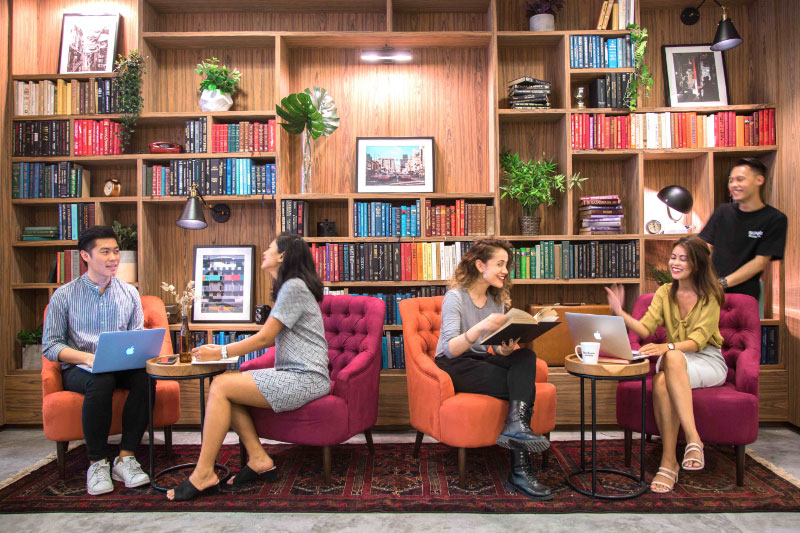
the Hive Carpenter, Singapore
The whole idea of the ‘workspace’ has morphed in recent years, as cubicle farms fast become a thing of the past and businesses prioritise flexibility, community and company culture. “We’ve seen a huge revolution in what people want as a workplace,” explains Constant. “Companies now recognise that traditional offices were never designed for the benefit of their employees. They were created for the corporate’s needs and for efficiency, without actually generating the best in terms of internal processes, relationships, productivity, or even employee happiness.” Now, both businesses and their employees want something different. “They’re increasingly thinking, ‘Do I need to keep this very large head office?’ ‘Do I want to be signing a 10 or 15-year lease?’ In addition, they need to brace themselves for the changing nature of corporate activity as AI develops to displace jobs, an inevitability that experts predict will take place within 15 years, affecting 40% of both blue-collar and white-collar professions. “It’s this increasing awareness and desire for a better workplace, plus the changing nature of large company human capital needs on the enterprise side, that are underpinning the growth in demand for flexible workspaces,” says Constant.
Still, demand aside, building and operating a coworking space in some of the world’s most expensive property markets isn’t without its obstacles. “Clearly leases are challenging here HK. The power of the landlord is very strong, with less landlord diversification than nearly any other city,” Constant shares. “Expanding abroad has also come with its own unique set of difficulties, especially when you’re trying to maintain a consistency of service. Take Tokyo, for example. As a foreigner looking to build a coworking space there, you have to familiarise yourself with the city reasonably fast and make a bet on a building and a location that you think is going to work. It can be quite nerve-racking.” In the seven years since the Hive first opened its doors, the coworking operator has faced its fair share of threats and challenges – some common to the industry such as mounting competition and sky-high property prices, others more unique (from the opening of the first location in Bangkok coinciding with the 2013-2014 Thai political crisis to super obscure Japanese import rules that prevented equipment from arriving). “We’ve made mistakes, but we’ve learned to adopt the lessons fast.”
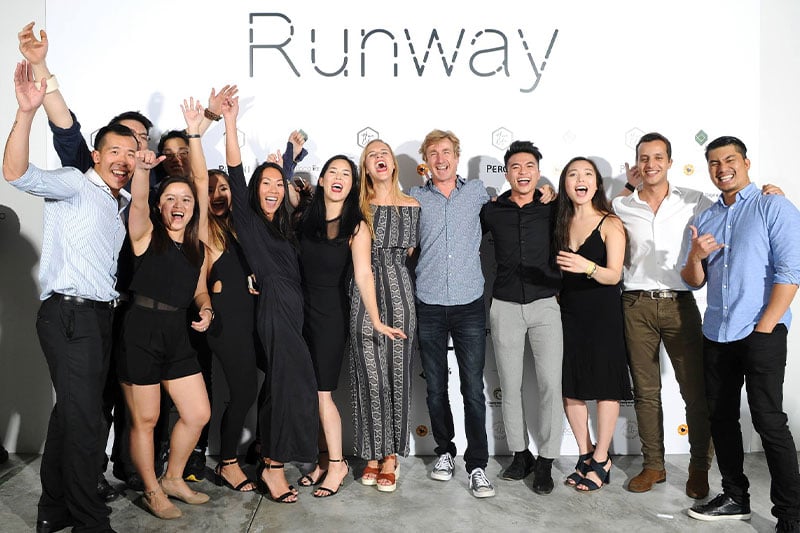
Team Photo at Flagship Live Fashion Show Runway
In addition, the whole coworking landscape has been affected by WeWork’s high profile travails in attempting to go public. For Constant, however, their difficulties are an opportunity. “For a long time, we have been thinking that the industry would consolidate around a few quality players and that it would not be a winner takes all market. This is playing out right now. On the ground, we have always questioned WeWork’s strategy which was predicated on being able to ‘capture the market’ – which is why they have had to offer such large incentives for companies to join – they have been competing not only with nimbler operators like us but also against themselves – opening too much capacity too fast. But, what we have seen, is that even when WeWork entered a city that we are operating in, we’re still able to keep growing. We’ve done this without the same pricing strategy and discount approach. We have more of a boutique operation with a higher level of attentive service and community engagement, which our members appreciate. In the end, having a differentiated offering with a strong service mentality has meant we have continued to win customers and to expand steadily but surely.”
“From where we sit, the future of flexible workspace and coworking still looks bright,” Constant says of the Hive’s landscape. “There are massive long term trends underpinning the growth in demand for flexible workspaces that are designed for member happiness. Just because WeWork’s head got too big, doesn’t mean the business case isn’t solid. People were saying that online retail would never take off after the dot com bust – now look at it. The same thing is happening in workspaces; they are changing for good reason. Companies want a different type of workspace as a service. Employees want a nicer working environment.”
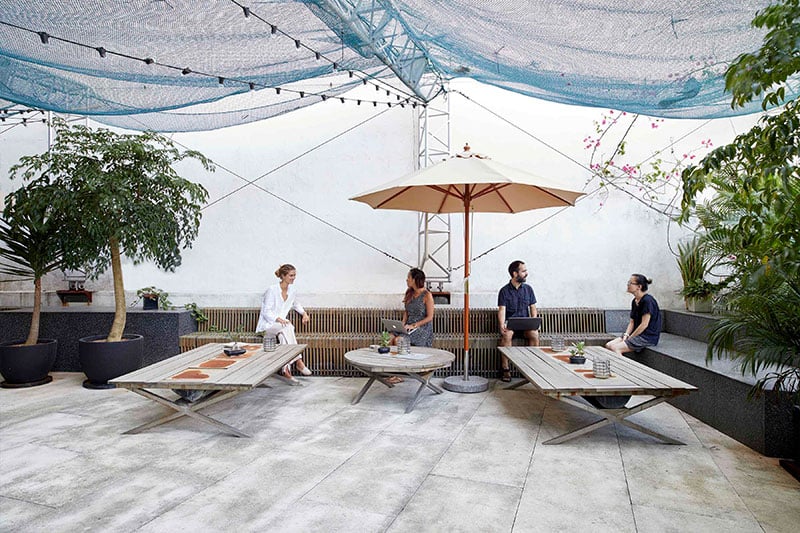
the Hive Spring, Hong Kong
Since founding the Hive, Constant has gone on to invest in several projects, becoming the lead investor and co-founder to agri-tech startup FlyFarm. In 2016, he founded early-stage venture capital firm Honey Capital and, in 2018, launched his not-for-profit environmental organisation Earth.Org in a bid to start giving back as he approaches 50. “Well, I guess there’s an in-built ‘not-quite-satisfied’ sense that every entrepreneur has,” Constant reveals. “There’s always that extra step you’re trying to take, that extra adventure that you want to have,” he says of his continuous desire to keep pushing for new ideas. Which means that, for him, slowing down is not on the agenda. “I hope not! I like to have challenges, to have fun building things, trying hard to solve problems. The challenge is the struggle, and the struggle is how you make progress. I think that’s much more fun than dealing with the same thing every day, and becoming settled or satisfied. I don’t think my desire to do difficult things is going to go away. It’s more likely that it will simply shift evermore towards sustainability and making a positive impact.”
There is no doubt that an entire career forged on your own path must take its toll. From financing and decision-making to dealing with unpredictability and uncertainty, entrepreneurship can be a rather lonely road. For one, there’s the difficulty of separating your work and personal lives when it’s you on the tiller. “I think that when you’re an entrepreneur, there’s no concept of work being one part of the day and leisure being the other part of the day and weekend. It’s all just living and striving. Leisure time was a Victorian invention, that came along with the rise of factories.” ponders Constant.
And, second, there is the insecurity – both psychological and literal – that comes with having your name above the door. Again, this is something he dismisses. “As an entrepreneur, you have to have a slightly higher tolerance for risk and uncertainty, as you’re often making very big bets. I probably take a lot more risk than is sensible, or that most people would find comfortable. But, my advice for balancing it would be that you have to judge what you can live with. If the bet goes wrong, you have to be able to say whether that absolute loss is something that you’d be capable of dealing with. Entrepreneurs who make small bets or are afraid to have their lifestyle affected – I don’t think that they’re necessarily going to make really successful entrepreneurs. You make a bet. You invest time, money and energy to make your shot the best it possibly can be. Every day, you see whether these bets, these decisions, go right. You cheer your team. And you celebrate when they do. And, when they don’t, you cry and commiserate with your team and learn, improve and go again. It’s a constant process, if you can excuse the pun.”
As our interview draws to a close, we touch on the typical questions one puts to an entrepreneur. Regrets? “Not taking RuneScape to mobile. And not starting an EduTech team at Jagex.” Thoughts on having a co-founder versus going solo? “It’s always beneficial to have a partner or a very close number two to bounce ideas off and add to the decision-making process.” Finally, we delve into whether or not he has experienced feelings of loneliness and isolation in his many years as an entrepreneur. For the first time in our interview, his thoughts take a few moments to form. “I think that, when you’re the sole decision-maker, you do feel a sense of isolation, as no one’s ever going to be quite as worried, or quite as dependent on the success as you are. Fortunately, I’ve been very lucky throughout my entrepreneurial journey. Being an entrepreneur is about finding the strength within yourself to start a project that you believe in, but it doesn’t mean you’re alone in this journey. I have been very fortunate in surrounding myself with very smart, loyal and hardworking people who have helped me bring my company to the level it’s at now. All in all, I’d like to emphasise the fact that being an entrepreneur is fun. It’s very fast-paced, different every day, and extremely rewarding.”
Related Articles
Accelerator Brinc Founder Talks About Planting the Seeds of Agtech
TEDx Speaker Diana Wu David: Why Success Doesn’t Mean Happiness
